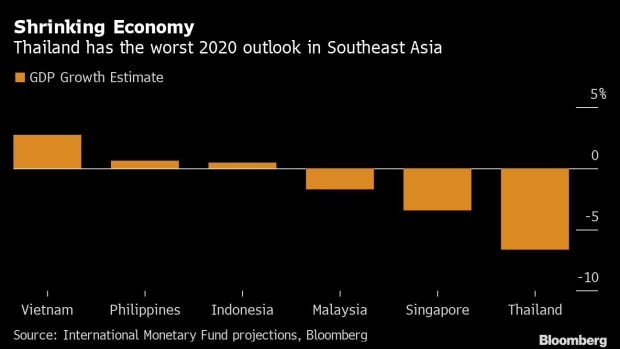May 24, 2020
Pandemic May Split Thailand’s Ruling Coalition, Says Opposition
, Bloomberg News

(Bloomberg) --
Thailand’s ruling coalition is at risk of fracturing amid infighting stoked in part by criticism of its response to the Covid-19 induced economic crash, according to the main opposition party.
Prime Minister Prayuth Chan-Ocha’s administration acted too slowly and lacked a vision for how to fight the fallout, said Sompong Amornvivat, leader of the Pheu Thai party. The next largest opposition party, Move Forward, signaled anti-government protests are likely once a state of emergency ends.
“We’ve seen the weakness in the coalition,” Sompong said in an interview May 22, citing tension between some of the more than a dozen parties in the bloc. “We’ve seen signs of cracks. A people’s movement, and the stability of the government, are the things to watch for.”
The risk of the coalition splintering could renew questions about whether Prayuth’s military-backed alliance can last its full term to 2023 after taking office in July last year following a disputed election. A political upheaval would add another challenge for an economy facing its worst contraction this year since the Asian financial crisis about two decades ago.
The party leading the coalition, Palang Pracharath, has rejected claims of internal discord and described Prayuth’s response to the crisis as “outstanding.” The comment followed rumors that party leader Uttama Savanayana, also the finance minister, could quit Palang Pracharath to form a new outfit.
Thanakorn Wangboonkongchana, a spokesman for Palang Pracharath, didn’t immediately respond to a request for comment.
The World Bank estimates the government’s stimulus of 15% of the economy is among the largest in East Asia and the Pacific. Tourism and trade reliant Thailand still faces a contraction of about 6% in 2020, and as many as 10 million jobs could be lost in a country that was already facing rising poverty.
The stimulus includes emergency cash handouts to spur consumer spending. Almost 29 million people applied for handouts of approximately $155 a month, but only about half qualified, leading to criticism that more needs to be done.
A state of emergency imposed in late March to curb the pathogen is set to be extended to the end of June. At the same time, Prayuth is easing a national lockdown in stages to kickstart the economy after infections dwindled, restricting the official tally to just over 3,000.
Prayuth, a former army chief, seized power in a military coup in 2014, ruled at the head of a junta for five years and returned as leader after the election, which was held under rules crafted during the junta’s tenure.
Before large gatherings were banned due to the virus crisis, he and his backers in the royalist establishment faced escalating protests from critics who dispute the fairness of the poll.
The emergency and lockdown amplified the dissatisfaction, said Pita Limjaroenrat, leader of Move Forward, the second largest opposition party. Move Forward emerged from the now disbanded Future Forward party, which was dissolved by a court just before the outbreak.
Students were protesting about a lack of opportunities back in January, and now laborers, business owners and the middle class are also reeling, he said, adding it’s as if “their problems are now on steroids.”
A Cabinet reshuffle and a change in policies is likely in the months ahead, said Punchada Sirivunnabood, an associate professor in politics at Mahidol University. “A lot of the protest movement that went online during the lockdown will return and intensify,” she said.
©2020 Bloomberg L.P.







